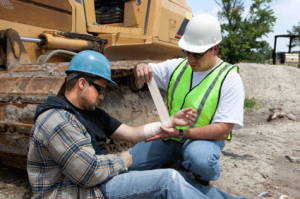 Challenges abound for today’s young workers. High unemployment rates mean young workers face greater competition from adults for jobs traditionally reserved for teens and 20-somethings. Young workers must also balance employment demands with those demands imposed by family, school or even other jobs. Further, today’s young workers are more likely to get hurt on the job in comparison to working adults.
Challenges abound for today’s young workers. High unemployment rates mean young workers face greater competition from adults for jobs traditionally reserved for teens and 20-somethings. Young workers must also balance employment demands with those demands imposed by family, school or even other jobs. Further, today’s young workers are more likely to get hurt on the job in comparison to working adults.
If you don’t believe the latter point, just ask Matt Pomerinke. Matt, of Longview, Washington, was recently working at a Washington lumber mill. During the course of his employment, Matt’s arm got caught in an unguarded conveyer drive chain. A result was that his arm was amputated just below the elbow. Matt was only 21 at the time of the accident.
Working Teens at Greatest Safety Risk
Get A Free Case Review
Free Case ReviewIn a confidential settlement for a commercial injury case.
Today’s young workers are more likely to get hurt on the job than working adults. Working teens suffer the greatest number of work-related injuries every year. According to the University of Washington’s Health and Safety Awareness for Working Teens (HSAWT), nearly 230,000 teens in the United States suffer a work-related injury per year. This number is twice as high as the same statistic for working adults.
In regards to Washington State, the HSAWT reports that between 2000 and 2006, 11,125 teens reported a workplace injury to the Washington State Department of Labor and Industries (L&I). “Ninety-three percent of those teens were 16-17 years old.” The HSAWT further reports that the most common work-related injuries for teens include: cuts, sprains, bruises and burns. We should also note that from 1988 through 2006, according to the HSAWT statistics, 15 teens died on account of workplace related injuries.
The Injured Young Workers Speakers Program
Call or text (800) 708-6000 or complete a Free Case Evaluation form
We mentioned Matt Pomerinke at the beginning of this post. Matt tells his story and speaks about safety awareness as part of L&I’s Injured Young Workers Speakers Program. This program brings young speakers who suffered severe work related injuries to high schools around the state. The program began in June of 2008. Since its inception, the program has educated over 3,000 teens throughout Washington. In addition to high schools, speakers from the program have made presentations at technical colleges, Job Corps schools and various skills centers.
For a free legal consultation, call
(800) 708-6000
What is the program’s success? Evalutaions show that the program results in greater work-hazard awareness for teens and young adults. Over the course of 2009 to 2011, 70% of teens attending the program reported that their awareness of work-related safety issues was significantly raised due to the program’s speakers. We, at the Phillips Law Firm, applaud the speakers from L&I’s program. We are remorseful for their injuries, but we are proud of their continued dedication in fostering awareness and education.
Young Workers Deserve Our Attention and Protection
Many young workers enter the workforce with vigor and vim. They show passion and dedication with a thirst to learn. These workers have decades of years in front of them that should be full of happiness, experiences, and the ability to see the rewards of their hard efforts. A serious injury could take away all of this in a matter of seconds. A serious injury could also destroy their job options for the future.
Teens and parents alike should realize that labor laws may differ for working adults and younger members of our workforce. Young workers deserve our attention to help ensure they understand their rights and responsibilities when it comes to their employment and our State’s labor laws. A greater understanding means nothing less than greater protection from work related injuries.
While we should all seek to provide this attention and protection, our firm solidly stands ready to lead the march. The attorneys at the Phillips Law Firm have years of experience in representing injured workers…both injured adults, as well as, injured teens and young adults. We know the pertinent laws and rules that are in place to protect our younger workers. Hopefully you will never require this knowledge, but if you do, simply contact us and let us pass it along.
Real People. Real Justice. (800) 708-6000